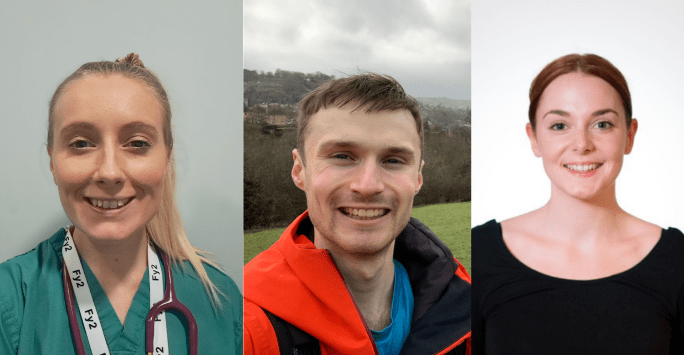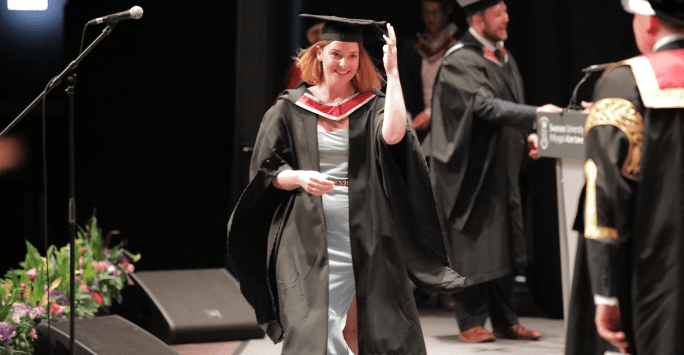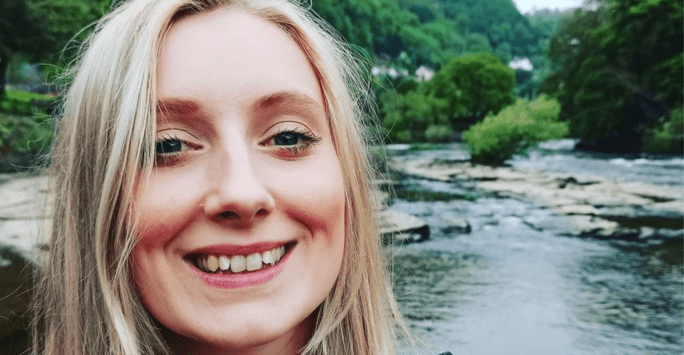
The Specialised Foundation Programme (SFP), previously known as the Academic Foundation Programme, is a great opportunity for foundation doctors to develop research, teaching and leadership skills alongside other competences in the Foundation Programme curriculum.
If this is an avenue that sounds appealing to you, it’s worth considering the kinds of activities and projects you can be engaging with now as an undergraduate to help dip your toes into this area and support a possible future SFP application.
The School's Careers Adviser Jennifer Connell says, "Whilst this isn't the only chance to gain these skills, it is certainly a good opportunity, early on in your career, to test out your interest in medical research, learn about leadership in healthcare or develop your medical teaching skills. You may use these skills later on to develop a portfolio career, or simply to complement your clinical skills. There's nothing to lose in applying. If you aren't accepted for the SFP, you will automatically be included in the allocation to the standard Foundation Programme, without any disadvantage to you."
Liverpool alumni Dr Jared Murphy (Class of 2020), Dr Vicki Simpson (Class of 2021) and Swansea University Medical School graduate Dr Katie-Rose Cawthorne share their insights into the programme and how best to prepare for it.
Where are you based?
Jared: I am currently doing my paediatrics training in the Mersey & Cheshire Deanery with continued involvement in academia. During my SFP, I was based at the Royal Liverpool University Hospital and was on the medical education strand.
Vicki: I am based at Royal Liverpool hospital (LUHFT), currently working in A&E. I'm on a medical education themed track but I've done bits of both teaching and research.
Katie-Rose: I am based at Aintree for my Research SFP. As well as being part of the Liverpool cohort, all SFP doctors in the North West are part of a regional cohort where we have monthly in-person teaching days across the region.
What motivated you to apply to the SFP?
Jared: My intercalated degree was an MPhil in Child Health, which was very research driven. I was fortunate enough to become involved in so many worthwhile and rewarding experiences, and I wanted more of that! I was also drawn to the opportunity of undertaking a PGCert in Medical Education, widening my demonstrable scope of knowledge, skills and experience and gaining a further qualification.
Vicki: I got quite lucky with my RS project at Liverpool and was able to publish and present internationally, which really piqued my interest of where you can go with research. I did a lot of teaching with different societies when I was a student, and I was keen to carry on with this.
Doing the SFP meant getting dedicated time to do those things and encouragement to build links and work towards an academic specialty training pathway if I wanted to.
There was no penalty for applying and not getting a job, so it felt like a no brainer to apply. Having the dedicated time and support to explore other interests has enhanced my foundation training experience so I'm extremely glad I did.
Katie-Rose: During the later years at medical school I found the clinical environment quite intense. I enjoyed being around patients and the hustle and bustle of the hospital, but not all of the time. I really enjoyed the student selected components and opportunities for research and realised this slower-paced, more cerebral style of work suited my personality and skill-set and provided a good balance to clinical work. I realised that I wanted to work this way longer term, having a hybrid of both clinical and academic work.
 Dr Katie-Rose Cawthorne
Dr Katie-Rose Cawthorne
What activities helped develop your interest in this area and were useful in your application?
Jared:The first thing is taking the time to find people/supervisors/mentors that you find interesting and inspiring and explore opportunities with them, take up opportunities offered to you and things will grow from there.
I really valued my intercalation in a research-based degree leading to publications in interesting and important fields, including a Cochrane systematic review and meta-analysis.
Opportunities in this year meant I also had the chance to give oral presentations at two separate international conferences and was recognised with a young researcher award at one of these, received a royal college prize and was involved in organising a national conference - none of which I really had any idea about before starting my intercalation year!
Vicki: I really pushed my RS project and had a very supportive supervisor who sought out opportunities for me to take it further. We are still working together on other things now and the experience I got from that has been invaluable in seeking out other opportunities through my SFP role.
You don't need to have necessarily published papers or headed up lots of projects for SFP applications, but it obviously helps to understand the sector.
My intercalation helped me start to develop my specialist interests in infectious diseases and global health, including getting published and making contacts in that area and getting points that helped with applications for SFP and will support specialty training applications. In hindsight, I'd have looked to achieve more prizes, like entering a royal society essay competition or putting myself forward for a local award, because they count quite highly in academic applications.
Katie-Rose: I was a graduate entry medicine student, so I used my network from my previous career in health technology to search for opportunities to boost my CV. I managed to secure a part-time job as a research assistant which gave me great skills in analysing data, writing research papers and presenting at meetings and conferences. I also made the most of our mandatory projects by looking into how I could maximise the time spent by submitting these to conferences for presentation.
In terms of getting interview-ready, a friend and I who were both applying for SFP did a lot of practice together.
In the weeks leading up to interviews we prepared both academic and clinical interview questions and practised two to three times per week, giving each other constructive feedback.
By the time my interview came, I felt confident with the messages I wanted to get across to the panel about why I would make a good SFP doctor.
What have been your main highlights on the SFP programme?
Jared: My focus on medical education gave me a chance to get closely involved with yet another new team, the simulation and clinical skills team at Liverpool University Hospitals Trust, who were so welcoming, encouraging and supportive.
I learnt new skills in running and delivering high fidelity simulation, debriefing discussions, delivering a range of teaching and talks to students and clinicians from a range of experience and disciplines.
It was a really nice change from solely clinical work and a chance to choose and focus on things which truly interest and develop you.
Vicki: I've had a PGCERT in medical education funded through my role, which is a very well recognised medical education qualification that lots of trainees spend good money trying to get hold of!
All trainees where I work get access to a study budget, but because of the PGCERT and extra study leave I've been able to take as part of my role, I've definitely had a lot more funding and opportunity for things like conferences and courses. I had a whole four-month block at the start of F2 where I was part of the medical education team and I still do a lot if teaching and side projects now, which I love.
Katie-Rose: As part of the North West SFP programme, we get monthly academic teaching covering topics such as research skills, project management and how to run a simulation session. In addition to structured teaching, we have had the opportunity to hear from successful clinical academics and had sessions to plan our career goals.
I always leave feeling inspired, and this time for reflection has meant I have identified new academic interests.
Following these sessions, another SFP doctor and I set up our own project looking at widening participation in the SFP. Without this time away from the wards, I wouldn’t have the cognitive space to be proactive in pursuing my interests.
 Dr Vicki Simpson
Dr Vicki Simpson
What is one area you have found more challenging? How have you approached this?
Jared: Sometimes it’s worth looking ahead to see what’s coming up which may be beneficial to you in terms of your development. Sometimes this can feel overwhelming with the sheer number of things you may come across or figuring out how to organise this, what to work towards etc.
I found having discussions with people who have recently been on the same or similar paths helps you figure out your next steps.
Vicki: Although I had the four month block to do academic projects, the reality is that work carries on beyond that. Particularly in med ed focused SFP jobs i think trainees tend to have more than one smaller project on, rather than one larger project, so you have to balance things and expect setbacks.
Ethics can take a while to come off, for example, or teaching dates have to be moved. I work in A&E now, which is a lot of shift work, and I'm still writing some of my PGCERT essays in my own time or on study leave if I've managed to take.
Katie-Rose: I’m less than full time (80%) so in order to meet GMC requirements I need to complete 15 months of FY1. My four-month academic block was due to be at the beginning of the normal FY2 year (August - December) but due to the extra time I require as an FY1, I had to move this to later in the year. While this is an issue specific to my circumstances, I would say that the wider lesson has been the importance of good communication. It was really important to keep my academic (research) supervisor updated on the changing time frames to ensure their expectations were managed and that they were still able to supervise me during the rearranged block.
What are your biggest tips for students interested in applying to the SFP?
Jared: If you have something which interests you or you’d like to learn more about, get involved in it! Even if it’s something small to start with, give it a go and let your interest and involvement grow and you’ll soon find yourself in a strong position to continue building upwards or branching outwards in your knowledge, skills, experience adding strings to your bow.
If you don’t fancy the first thing you try, that’s fine, keep getting involved and before you know it, you’ll be well rounded, interesting and experienced.
Vicki: Attend the Foundation Programme talks the School organises or watch the recordings from last time around. You lose nothing in trying to apply apart from some time, so it's worth having a go at the application, even if you later withdraw.
Have a look into how the programme is run in different areas, because it isn't uniform across all the foundation schools.
There are also lots of different 'alternative' foundation programmes like the priority programme, and lots of other ways to carry out teaching or research in your job.
Katie-Rose: I can’t overstate how important networking is. I would recommend identifying your interests and reaching out to people who are working in those areas.
When you identify a good mentor, you can then offer your time to work on their projects, gaining valuable experience for your future career.
That being said, it’s important not to overcommit yourself. Before offering your time, be sure to reflect on how much time you can realistically offer a project, whether it’s a day per week or just an hour. Being upfront from the beginning means you’re able to manage expectations and demonstrate your reliability.
Discover more
- Considering the SFP? Participate in our upcoming live online sessions on Wednesday 7th June, Introduction to the SFP, and Wednesday 14th June, Applying to the SFP, delivered by Dr Vicki Simpson. Stay tuned for further details.
- There are plenty of opportunities available via the INSPIRE programme (link) to further your interest in research, teaching and the Specialised Foundation Programme.
- Take a look at the benefits and opportunities you can unlock by getting into research as an undergraduate (link), which will support your SFP application.
- Join a society and boost your teaching, organisational and leadership skills. Browse through the long list of medical societies in operation via the Guild (link).
- Attending and presenting at research conferences are a great way to build up your portfolio. See how the School can support you in this on the Academic Conferences webpage (link).